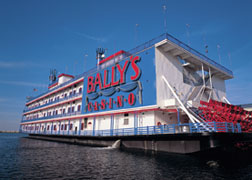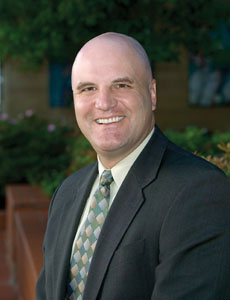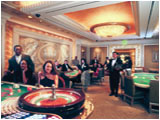Risky business
For the world's premier gaming company,
risk management is no gamble
Elisabeth Boone, CPCU
What has 25 casino resorts, 25,000 hotel rooms, nearly 70 theaters, 16 luxury spas, five championship golf courses, and more than 100 retail locations?
That would be Caesars Entertainment, Inc., the world’s largest gaming company. With a worldwide staff of 52,000 employees, Caesars is based in Las Vegas, home of the brightest lights, the hottest stars, the biggest dreams—and, for the lucky few, the fattest jackpots. From small-town senior citizens on a bus tour to high rollers in Bentleys, millions of people are drawn to Caesars’ casinos each year, some to wager a few bucks at the nickel slots and others to roll the dice at high-stakes tables.
People visit casino resorts not just to wager but also to eat, drink, shop, swim, golf, and enjoy glitzy shows by the likes of Elton John and Celine Dion. Providing these pleasures is costly and complex, but perhaps the biggest challenge is designing a risk management program that addresses the myriad exposures created by these pursuits. That’s the job of Lance Ewing, ARM, CRM, vice president of risk management for Caesars Entertainment. Ewing has held senior positions in loss prevention and risk management with insurers and other corporate entities.
Risks run the gamut
What are the key exposures that face Caesars Entertainment, and how do Ewing and his team approach them? Ewing groups risks into three categories: operational, financial, and legal. Like most businesses, Caesars has operational risks in the areas of property, general liability, and workers compensation risks.
A major operational risk category is hospitality: the myriad exposures connected with providing guest services that range from housekeeping and valet parking to hosting conventions and weddings. At each of its facilities, Caesars owns shops, bars, and restaurants and also leases space to merchants and restaurateurs. Caesars also owns and operates five golf courses across the United States. Ewing points to a risk that’s a bit off the beaten path: “In Mississippi we own an ice house that produces ice for use on shrimp boats.” Outside the United States, Caesars has exposures in South Africa, Uruguay, and Canada. “We’re growing internationally, including the U.K.,” Ewing comments.
Hospitality risks aren’t all land based, Ewing notes. Caesars operates four yachts on which guests are entertained, and it maintains gaming venues on three cruise ships on the Crystal Cruises line. These operations, Ewing points out, create exposures under the Jones Act, a federal law that applies to maritime workers.
What’s more, Ewing says, “We have a full fleet of airplanes that we use to fly our guests to and from our destinations. We also charter aircraft; last year we chartered more than 900 planes.” With respect to aircraft, “my biggest concern is severity and reputation risk.” Confronted with risks of this magnitude, “We do a lot of mental risk modeling in order to think about those ‘what if’ situations and how we would respond appropriately,” he says.
Another kind of operational risk for Caesars relates to information technology. “We maintain a huge amount of data. Customers can make reservations and other arrangements online,” Ewing says. “Cyber risk is something we’re keenly aware of as our reliance on IT keeps growing.”
Rules of the game
Specific to the gaming industry are financial risks that arise from extending credit to players, as well as security concerns related to the use of cash in casinos. Other financial risks are associated with regulatory issues. “We’re accountable to the gaming commission in each of the states in which we operate,” Ewing says. “Without the commission’s approval, we can’t make an investment or take out a loan; we can’t hire someone at the director’s level or higher; we can’t have a joint venture or partnership. We’re highly regulated, and it’s an important aspect of our risk management effort to make sure that we maintain responsible gaming.”
From the standpoint of financial risk, Ewing says, “The thing that worries me the most is that the gaming commission in one state wakes up one morning and says, ‘Gee, we’re only getting seven cents on the dollar from casinos; let’s move that to 27 cents on the dollar.’ That’s a variable that depends on the legislature and the gaming commission in each state, and it’s a major financial risk for us.” The question, Ewing says, is, “How do we protect ourselves from that risk? The obvious ways are by maintaining good will in the community and the legislature. For example, in Atlantic City we give back to the redevelopment authority to support it in building and operating low-income housing.”
On the legal side, Ewing’s department handles litigation management for all of the organization’s claims. “From the legal standpoint, what concerns me most is punitive damages, class action lawsuits, and the runaway jury,” Ewing says. “We have to mitigate that risk, and we have to put our best foot forward in defending ourselves. On the legal side, my approach to risk management has always been that the best defense is a good offense,” he says. “We try to address the risks before something happens so we can stop those claims from occurring.” As an example, Ewing cites flooring. “Slip and fall are frequent types of incidents; how do we prevent those from occurring? We do appropriate testing to make sure the floors are safe.”
Putting it together
Clearly, Caesars Entertainment faces a multitude of risks involving people, property, regulation, and reputation. How is the risk management operation structured to address these exposures? “When I first got here in 2002, our risk management was fragmented, but not in a negative sense,” Ewing comments. “Workers compensation was part of human resources; safety was reporting to the controller. Claims had a dual relationship, part legal and part operational. When I got here, I pulled all of those resources together under one ‘enterprise risk’ approach to Caesars risk management. Our philosophy in risk management,” he continues, “has been ‘one voice, one direction’ instead of a splintered approach.”
 |
 |
From glitzy shows to gaming riverboats, Caesars Entertainment faces a multitude of risks involving people, property, regulations and reputation. |
The risk management department has 48 employees. “A majority of them handle claims; others deal with safety and environmental issues,” Ewing says. “We have a risk analyst on staff, and a risk manager who reports to me.” The department is further organized into regions, each with a director of claims. Ewing reports directly to the CFO and to the general counsel.
“From my standpoint, I live in the best of both worlds,” Ewing observes. “I have face time with the decision makers of the corporation, including the CEO and the board of directors. I also report to the board’s compliance committee on insurance and risk management. I’m truly blessed to have the key decision makers of the organization available to me to help move things forward,” he says. “As a vice president, I have the opportunity to make decisions that affect the company on a day-to-day basis as well as helping to formulate the future. I also sit on our corporate disclosure committee, and the risk management department reviews everything that appears in our annual report or in our filings with the Securities and Exchange Commission, and anything that goes out to our shareholders. My CFO puts his name on these statements, and he believes that everyone should have the opportunity to make sure that the information has integrity and accuracy.”
The right technique
Given the variety and magnitude of Caesars Entertainment’s exposures, Ewing and his department employ a variety of risk transfer techniques. “On workers compensation, we take a large self-insured retention and purchase excess insurance,” Ewing says. “Here in Las Vegas, we have somewhere between 12,000 and 14,000 employees on the Strip at any given time. That’s more of a concentration risk than a lot of insurers are willing to take from an insurable standpoint. We believe we can absorb some of that exposure, so we self-insure quite a bit.” In other lines, Caesars will vary the deductible depending on whether the line is driven by severity or frequency.
“We also have a captive domiciled in Hawaii, but we have not yet put anything substantial into it,” Ewing says. “We have a merger pending, and after it’s completed, making more use of the captive will be the next step in our risk management effort. The captive is certainly something we’ll be looking at, both for our own internal use as well as some potential fully controlled third-party insurance. For example,” he says, “from time to time we have a foreign musical group come to Las Vegas, such as a mariachi band from Mexico that would perform for Cinco de Mayo. They normally don’t carry general liability insurance in Mexico. We’re taking the risk anyway, because we have a large pocket, so we would issue the band a policy. We would control it and make sure that contractually we were covered, and we would thereby create an opportunity for the band to have some protection.”
The enterprise approach
“Here at Caesars,” Ewing continues, “we practice enterprise risk management by reviewing every contract before it is signed. We review each contract for the scope of work it addresses, and for the appropriateness of the risks we may be assuming. My approach has always been: How do we get to ‘yes’ and not always say ‘no,’” he says. “In some corporations, people say, ‘Don’t show it to the risk management department, because they’ll always turn you down.’ Our philosophy is: Show us what you have, and we’ll see how we can make it work. We’ll come up with options and solutions. Now departments call us and say, for example, ‘We’re thinking about having someone at the Reno facility jump off the top of a building and parachute down. It’s a great promo for us. What do you think, and what do we need to do to make sure this goes off without a hitch?’ People wouldn’t come to us with those ideas if they didn’t think we were going to work with them as a partner,” Ewing says. “In risk management, it’s critical that we be looked at as, first, a resource and, second, a partner, and not looked at as the insurance department or the department that says ‘no.’ ”
At Caesars, enterprise risk management extends well beyond marketing, Ewing says. “In our retail sector, we have to consider which retailers we’re going to put into our properties and where. We certainly don’t want a fireworks store next to a Versace shop,” he says with a laugh. “Another concern is the construction companies we use,” Ewing notes. “We have construction going on all the time. We are firm believers in owner-controlled insurance programs (OCIPs), where we get to tell the general contractor: ‘You’re buying insurance through us. We will purchase the workers compensation and general liability coverage; we will handle safety and claims settlement. You give us the cut rate on your insurance that you were going to pay anyway.’ We’ve been very successful in all of our operations in actually making money on construction,” he says. “The OCIP approach is another risk transfer mechanism that has benefited the organization overall.”
Working with brokers
“I’m a firm believer in competition by all of our service providers, so we deal with two brokerages: Marsh and Willis,” Ewing says. “I inherited both of them when I got here, and I’ve worked to educate them about what I expect from them. Both of them have responded by becoming more client focused. Having been on the carrier side, I have a very good understanding of what the underwriters are looking for, and I think that helps make our brokers’ job a little bit easier when we’re preparing a presentation for a carrier. I like to tell our story, and I enjoy giving our presentation to the underwriters.”
Ewing offers a tongue-in-cheek view of the broker’s role: “I tell them that their job is to make me look good. When they don’t, I’ll certainly remind them of that, and when they do, I’ll reward them. We’ve begun to build into our broker agreements both incentives and disincentives,” he explains. “If a broker performs at a certain level, it will be paid X fee. If the broker performs below that level, it will not get that fee.” Ewing is happiest, he says, when “I can reward a broker who’s doing a fantastic job for me.”
Agents as risk managers
Huge organizations like Caesars Entertainment not only employ a high-level executive like Ewing for risk management but also maintain a sizable in-house staff whose members are responsible for all aspects of risk management. Smaller companies may not have a full-time risk manager, and therein, Ewing believes, lies an opportunity for independent agents and brokers to perform a valuable service for their clients. “I think independents are beginning to realize that they’re already performing some day-to-day risk management functions for their clients,” Ewing says. “In addition to marketing and placing the account, the independent agent is fielding questions from the client like, ‘Can you help us develop a policy on employment practices liability?’ or ‘What kind of training should we do?’ I think independent agents should get the education they need to answer questions like these that clearly relate to risk management.
“Having that resource available is critical,” Ewing says. “Say I’m a small business owner and you push a policy across the table and say ‘Here’s what the premium is; thanks very much,’ and get up and leave. Another agent comes in and says, ‘I’ll be spending about 50 hours a year evaluating your risks, doing some loss prevention and training.’ This agent is offering me some ‘sleep at night’ insurance that I would much rather have even if it’s a little more expensive, than a policy that’s sold to me like it’s a loaf of bread,” Ewing says.
For smaller brokers, Ewing suggests, “Take a risk manager to lunch.” This will allow the broker to gain valuable insights into risk management trends and techniques. Some smaller brokers, he notes, are pooling their resources to retain a risk management consultant who can work with each broker to develop solutions for that broker’s clients. Whichever approach a smaller broker uses, Ewing says, “Being able to offer your clients risk management services is a great selling tool.”
Gaming may be risky business, but Lance Ewing and the Caesars Entertainment risk management team have the skills and savvy to cover all their bets. *






